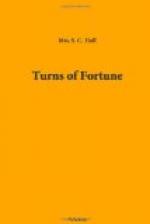Sarah, heart-broken, and silently weeping, retreated to the table, and again, after turning the fire, betook her to her solace—the precious volume that never fails to afford consolation to the afflicted. She read a few passages, and then, though she looked upon the book, her mind wandered. She recalled the happy days of her childhood, before her father, by the extraordinary and most unexpected bequest of a distant relative, became possessed of property to what extent she could form no idea. She knew that this relative had quarrelled with the heir-at-law, and left all to one he had never seen. This bequest had closed up her father’s heart; instead of being a blessing, so perfectly avaricious had he grown, that it was a curse. Previously, he had been an industrious farmer; and though a thrifty one, had evinced none of the bitterness of avarice, none of its hardness or tyranny. He could then sleep at nights, permit his wife and children to share their frugal stores with those who needed, troll “Ere around the huge oak,” while his wife accompanied him on the spinnet, and encourage his daughters to wed men in what was their then sphere of life, rather than those who might not consider the gentle blood they inherited, and their superior education, a sufficient set-off to their limited means and humble station. Suddenly, riches poured in upon him: his eldest daughter, true to the faith she plighted, would marry her humble lover, and her father’s subsequent harshness to her favourite child broke the mother’s heart. Sarah not only had less firmness of character than her sister, but loved her father more devotedly, and gave up the affection of her young heart to please him. His narrow nature could not understand the sacrifice: and when her cheek faded, and her really beautiful face contracted into the painful expression of that pining melancholy which has neither words nor tears—to lull his sympathy, he muttered to himself, “good girl, she shall have all I have.”
No human passion grows with so steady, so imperceptible, yet so rampant a growth as avarice. It takes as many shapes as Proteus, and may be called, above all others, the vice of middle life, that soddens into the gangrene of old age; gaining strength by vanquishing all virtues and generous emotions, it is a creeping, sly, keen, persevering, insidious sin, assuming various forms, to cheat even itself; for it shames to name itself unto itself; a cowardly, darkness-loving sin, never daring to look human nature in the face; full of lean excuses for self-imposed starvation, only revelling in the impurity and duskiness of its own shut-up heart. At last the joy-bells ring its knell, while it crawls into eternity like a vile reptile, leaving a slimy track upon the world.




